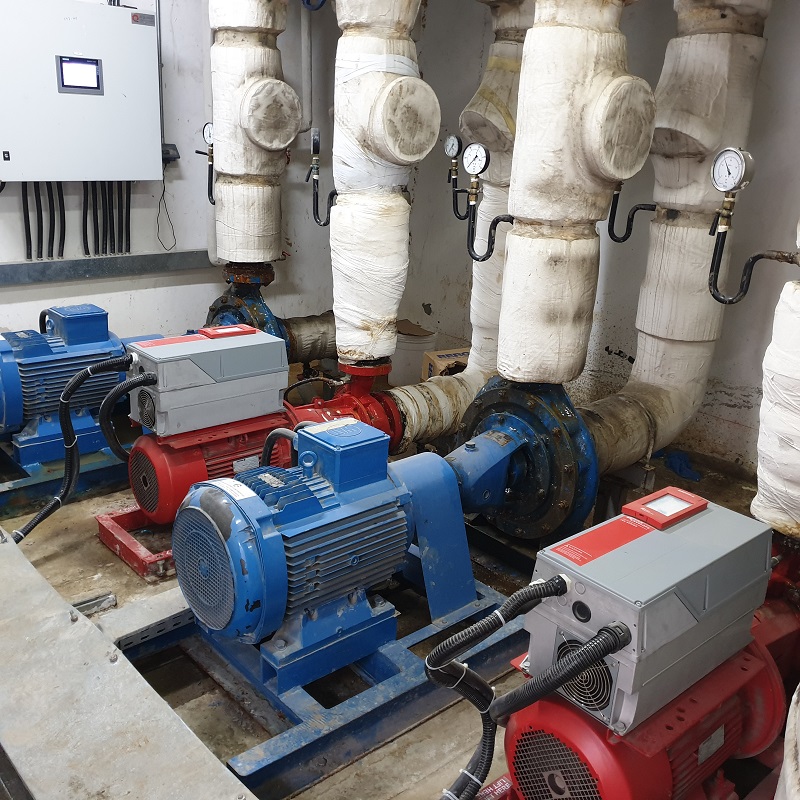As seen on: mepmiddleeast.com September 18, 2021
“The time to embrace energy efficient technology solutions in the Middle East is NOW! Stakeholders need a strategy that unites individual sectors”

Energy plays a crucial role in our daily lives and in the economy. Energy is not only a basic human need, but also a strong indicator of social and economic development.
As our world becomes more urbanized, global demand for energy is increasing rapidly, with expected growth of 55% over the next ten years. With this growth comes increasing concern about energy security, economic competitiveness and of course, environmental impact.
These concerns have led to global focus on energy use reduction and the re-emergence of energy efficiency as a key consideration.
Government entities and private organizations around the world are increasingly implementing measures and programs to support smarter energy consumption and improve efficiency, and the Middle East is no exception.
In the region, energy consumption has actually grown faster than GDP since 1980. Fueled by population growth, infrastructure developments and the growth of energy-intensive industries, the energy consumption rate of countries in the Middle East are among some of the highest in the world.
Given the region’s expected future energy demand, now is the opportune time for countries in the Middle East to re-commit to improvements in energy efficiency, as a way to reduce the region’s carbon footprint.
Building facilities account for a major portion of energy consumption – responsible for an estimated 40% of all energy usage, and a similar proportion of greenhouse gas emissions.
One way to improve efficiency and reduce energy consumption and is through transforming the way our buildings operate.
A vital element to improve energy efficiency in buildings is performance management of mechanical systems.
This practice involves proactive tracking, systemic management and thoughtful optimization of energy consumption in a building, with the goal of optimizing systems to improve efficiency.
Energy efficiency is determined by a number of factors. We must consider system design, quality of installation and maintenance, efficiency rates and personal use.
If we assume a system is designed with the greatest efficiency in mind, its effectiveness is still significantly impacted by installation, maintenance and use.
A challenge commonly faced in building facilities is ‘performance drift’. When first installed, and even for the first few months of operation, HVAC systems operate immaculately.
However, over time component efficiency and system conditions ‘drift’ away from the originally installed operating curve, causing system efficiency and performance to degrade incrementally.
Furthermore, human input can also affect efficiency. For example, an operator simply closing a valve in one or more locations can affect the system performance.
The deteriorating performance of HVAC systems has a deep impact, leading to wasteful energy consumption that result in higher costs, increased emissions and reduced comfort for building occupants.
Optimization of systems creates an opportunity to improve energy. Systems are traditionally designed as an assembly of independent components with limited connectivity and performance monitoring technology. Traditional design will function and support indoor comfort.
However, this design approach leaves components operating in disconnected functional silos or islands and creates an environment that is vulnerable to the effects of performance drift.
In my experience with Armstrong Fluid Technology, adopting a more holistic approach, that incorporates innovative technology, is the key to improving energy efficiency. In the last decade, technology for HVAC systems has been enhanced to deliver up to 70% energy efficiency savings compared to traditional systems.
For example, demand-based control ensures energy is consumed only on a need-basis. Parallel Sensorless pumping technology enables pump performance to adjust automatically according to system load and run at lower speeds. Innovations such as these enable pumps to operate at optimum levels to consume as little energy as possible.
In the Middle East, cooling systems work particularly hard to counteract the warm climate. Upgrading cooling systems is another opportunity to improve efficiency.
Variable speed pumps, such as Armstrong Design Envelope Pumps, are an effective solution for upgrading cooling systems. These pumps optimize system performance and also respond to real-time system conditions to dynamically adjust equipment operation and match system demand.
The result is highly efficient cooling systems that deliver substantial energy savings compared to conventional fixed speed pumps.
This was the case when our Design Envelope Pumps were installed at La Ronda chocolate factory in Dubai. The factory is part of Notion Group’s property portfolio. To support sustainability in their facility, Design Envelope pump technology was installed, combined with Parallel Sensor less technology, which is capable of achieving savings of up to 90% compared to traditional, constant speed systems.
The pumps are designed for long life and ease of maintenance. A split-coupling design, enables all mechanical seal components to be removed for servicing without the need to disturb other pump components.
In the three-month period after the installation, the plant saved 118,355 kWh of energy, for a cost reduction of $14,633. These savings also represent a reduction in carbon emissions of about 30,000kg.
The pumps at La Ronda chocolate factory were also integrated with Pump Manager – our cloud-based performance management service that provides real-time and historical data to deliver an accurate system performance analysis.
The Pump Manager service provides insights into system operation and performance to support informed decision-making. Active Performance Management helps address performance drift. With the proper approach to systems management operators can prevent, or even reverse, the loss of energy efficiency in mechanical systems.
Without the ability to analyze data, buildings managers and operators can’t effectively optimize mechanical systems.
Pump Manager also helps to create safer and more comfortable indoor environments by enabling condition based maintenance. Systems can provide alerts when they detect issues, allowing for early detection to prevent failures and service disruptions.
One reason building operators sometimes hesitate to upgrade their HVAC systems is because technologically advanced systems require more investment.
However, the returns from using more efficient systems show me the value of careful investments. Our recommended strategy for upgrading mechanical systems in buildings starts with upgrading the pumps first.
With intelligent connected pumps installed, the Pump Manager service enables operators to use data to inform decisions on upgrading larger, more expensive HVAC equipment in the future.
Operating savings start from day one and simple payback is usually reached within 5 years. Energy savings can continue for the life of the system, delivering up to 40% savings on consumption related to HVAC operation.
Currently, many countries in the Middle East have established sustainability initiatives with efforts to reduce energy consumption. In order to truly drive energy efficiency across industries, what countries in the region need is an integrated energy efficiency strategy.
It’s worth noting that green construction trends are on the rise worldwide, encouraging countries to enact legislative requirements for building sustainability.
In response, HVAC technology is rapidly advancing to better support sustainability. To truly change industry behavior, stakeholders need an overarching strategy that unites individual sectors, and their supply chains, around a single set of objectives, all focused on driving energy efficiency and enhancing sustainability.



